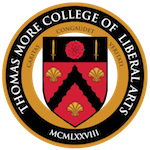Over the past month, Thomas More College undertook a number of measures in response to the recent outbreak of coronavirus (COVID-19), including: the successful preparation for keeping the College independent and in full supply of its needs; a safe and complete withdrawal of its Rome Program students; and the establishment of a new set of policies to carry it through the coronavirus crisis. All that ended over the past few days, as public health strategies and governmental directives rendered the College’s residential operations impossible. (These developments are all chronicled on the College’s dedicated COVID-19 page.)
“We had gone through so much already and with such success,” remarks President William Fahey. “We were the last American College to pull out of Rome. Thanks to our staff and the good-natured seriousness of our students, the withdrawal from Italy was done safely. We were the last institution of higher learning to remain in full operation in New Hampshire—and one of the very last in New England. Our faculty and staff were prepared to ride out the storm; the students were spirited and committed. But we must trust those who are invested with public authority. Our hand may have been forced, but we need to put that aside. Now we move with determination into a new kind of existence.”
Between now and March 23rd, Thomas More College will be shifting to remote learning and instruction mode, in which the institution will activate online capabilities to maintain instruction through the term. “We are a small, Catholic, residential College—but one aspect of being small is that we can pivot quite nimbly for the sake of our students and the preservation of our mission,” says Dr. Fahey. The rapid transition is made possible due to careful software choices made years ago. “When I was looking at what programs would best serve the administrative needs of the College,” recalls Admissions Director Zachary Naccash, “I recommended that we choose one that would allow us remote learning capabilities. That’s not our style, but it is always good to have resources available.” Mr. Naccash, along with Academic Dean Jay Thompson, will be heading up the transition to remote learning.
“We will do all we can to make a lesser mode of education something interesting and engaging,” notes Dominic Cassella, Assistant Director of Communications and Operations. Mr. Cassella has worked relentlessly to help upgrade the website and prepare the College for its next phase. He, like Mr. Naccash, also has direct experience in remote learning. “Zack and I are both working on graduate degrees that involve considerable online instruction. We have a good sense of what is possible and what the limits are.”
“There is not a soul around the place who believes remote learning can hold a candle to our residential college and its conversational mode of learning,” says President Fahey. “But in this hour we will enter the adversity and make it intellectually rich, make it a source of grace, and do our best to make it mirthful.” President Fahey speaks from experience since he, too, has spent two years studying online learning and taking online courses.
“We move into the unknown. That’s just fine,” says Fahey. “Our spiritual patron—St. Thomas More—is a model for us all through his very human, but steadfast, abandonment to Divine Providence. Today, I am very aware of St. Joseph and his burdens. Listen to the Infancy Narratives, especially the Flight to Egypt:
And … behold an angel of the Lord appeared in sleep to Joseph, saying: Arise, and take the child and his mother, and fly into Egypt: and be there until I shall tell thee. For it will come to pass that Herod will seek the child to destroy him. Who arose, and took the child and his mother by night, and retired into Egypt: and he was there until the death of Herod: That it might be fulfilled which the Lord spoke by the prophet, saying: Out of Egypt have I called my son. (Gospel of Matthew 2: 13-15)
“Today, the Solemn Feast of St. Joseph, is normally a moment of rest or relief in the midst of Lent. We lighten our penances and celebrate the Church’s noble patron. So must we still. In our recollection and praise of St. Joseph, we must recall his own actions,” says Fahey. “I am reminded at this moment of Joseph’s silent obedience to the prompting of God, his trust in the Angel, his rapid movement into Egypt to protect the Holy Family. That move must have been uncomfortable, even perhaps dangerous: it meant leaving the Holy Land, leaving normality and security, leaving behind the accustomed roads to Jerusalem and the Temple.
“At the time of Our Lord’s Nativity, the Holy Family was only a few miles from Jerusalem, a simple walk. So close, and yet so distant. I am thinking of this especially as every Diocese in the United States has restricted or ended public access to the Mass. Yet one can’t imagine that family life ceased, prayer life ceased, or vocations were put on hold. Somehow, in the face of danger and disruption, Joseph led them through. So, in a very solemn way, this is a good day for Thomas More College to move into its own exile, its own Egypt. We move with confidence in the protectors of the Church and, on this day, especially St. Joseph.”
For further reading:
President Fahey Gives Video Address about TMC and COVID-19 Crisis
